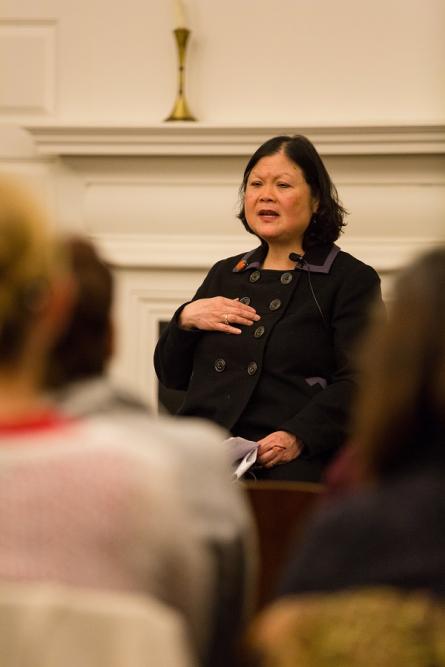Anyone expecting Carolyn Woo to outline the mechanics of NGO management in her public talk at Yale Divinity School was in for a big surprise—and an even bigger amount of inspiration.
Woo, the former business school dean at Notre Dame and now the President and CEO of Catholic Relief Services, focused her YDS remarks on mercy and the man who is probably its biggest global champion: Pope Francis.
 “The most important thing to Pope Francis is that people return to sensing the presence of God,” said Woo, who was at YDS to lecture in the weekend-intensive course on Faith-Based Leadership and Social Justice April 8-9. “He wants people to recover a sense of God’s love so they have a future, so they have joy—so they can have a reimagining of who they are and a conversion of heart, a heart for their neighbor.”
“The most important thing to Pope Francis is that people return to sensing the presence of God,” said Woo, who was at YDS to lecture in the weekend-intensive course on Faith-Based Leadership and Social Justice April 8-9. “He wants people to recover a sense of God’s love so they have a future, so they have joy—so they can have a reimagining of who they are and a conversion of heart, a heart for their neighbor.”
The timing was impeccable. On the same day, Francis and the Church were big in the news for his much-anticipated exhortation on the place of non-traditional families in the church, issued just hours before Woo’s talk. In the words of the Washington Post, the Pope’s message “offer(ed) hope to divorced Catholics” by encouraging priests to exercise their judgment and leeway in applying church doctrine to the lives and situations they encounter day to day.
Woo explained to a large crowd in the Common Room that Francis is dedicated to reversing a tendency that finds “a Church that is turned inward on itself, that has lost its spark and missionary zeal, that has become more concerned with rules and judgment, like a gate more than a welcome.”
Woo, who grew up in Hong Kong, was dean of Notre Dame’s Mendoza College of Business for 14 years before becoming the head of Catholic Relief Services in 2012. Formed in 1943, CRS assists impoverished and disadvantaged people around the globe while its sister organization, Catholic Charities USA, does the same in the United States.
In December, Francis inaugurated a Year of Mercy, during which temporal punishments are removed for all Catholics provided they go to confession, receive Communion, and pray for the Pope. As is known to anyone following the news, of course, Francis has modeled a more general concept of mercy and forgiveness in his statements and his interactions with the public, including people outside of the Catholic—even the Christian—faith.
Woo has met the Pope several times, she told her YDS audience, and regrets that her poor Spanish makes it difficult for her to understand him. But one does not need to understand his words to see his joyful love of God, she said.
The role of CRC, Woo emphasized, is to make that love real in the world, “to say to the world that hope, kindness, and generosity are much alive because God is present. We are the hands and feet that give manifestation to God’s love.”
Working among populations like Syrian refugees, Woo said, CRC workers often hear pleas like this one articulated by a mother in war-ravaged Aleppo, Syria: Please don’t let the world abandon us!
“The Pope’s message,” Woo said, “is that God abandons no one.”